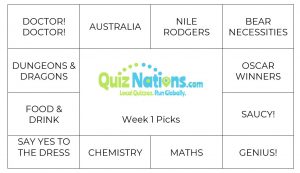Format & Rules
Quiz Nations is an innovative team quiz that was developed during Covid to get teams chatting and working together. It’s fun and friendly, and all players are expected to play within the rules and the spirit of the rules. The rules exist to ensure everyone can be assured of fair play. By taking part in our competitions, players are deemed to have read and accepted the rule and the Code of Conduct.
- Four players take part in each match plus each team must provide a reader or a scorer. The numbers of players in each squad varies from league to league. Some have up to six players and Quiz Nations Global allows up to eight.
- It is recommended that squads contain a minimum of five players, so that someone is available to read or score.
- Each home team must supply someone to proctor their home games (i.e read the questions). This can be a member of the squad that is not playing that game, or someone from another team. Refer to the Reading Guide for further info.
- The away team is expected to provide someone to score and keep time.
- There is no qualification required to play.
- For Quiz Nations Global, teams will be placed into geographical groups during the qualification phase. Other leagues will have different ways of grouping teams.
- Group play structure will be determined the number of teams.
- The top team/s from each Quiz Nations Global group will qualify for the Champions League component, as will the top teams in country leagues.
Costs vary from league to league, so please refer to your country’s league manager to check.
Quiz Nations Global
The cost per team for a 10 week season (minimum of 9 games per team guaranteed) is:
- £100 (UK)
- $130 (USA and Canada)
- €120 (Europe)
- $200 (Australia and New Zealand)
Discounts are available for teams from developing nations.
Most questions will be fairly short in length, and are both read out by the proctor and available in written format in the chat window or via screen share.
Questions are written by a panel of experienced writers and verifiers from around the world to ensure to ensure quality, playability and a global perspective.
Quiz Nations has been designed to test the whole team and individual players in the team too. It has a total of 60 questions in each match. Thirty-two questions are played by individuals and the remaining 28 are played by the teams.
The matches should take roughly 50-60 minutes to play
Each match will have a unique question set arranged around ever-changing topics such as:.

Shortly before the quiz match starts, your team will be sent two ‘Topics Sheets’ with the topics selections for the week, so you can discuss tactics before you enter the room.
Individual Element
Players take it in turn to choose a topic from a list – beneath each topic there are two questions. The player is asked each question:
- – If they get the answer right, the team gets two points.
- – If they get it wrong or fail to answer, it goes to their teammates for one point.
- – If they get it wrong or fail to answer, it goes to the other team for one point.
(TEAMS CANNOT CONFER AS THEY CAN BE HEARD BY THE OTHER TEAM WHEN PLAYING ON ZOOM)
Team Element
After all the players have answered their questions, there will be four topics remaining – two for each team. This time, the teams can confer as the questions are not passed to the opponents.
There are also two ‘mystery boxes’ that each contain three questions from the topics in the current questions packet. Each team plays one ‘mystery box’.
All team questions are worth two points.
Format
Matches consist of 60 questions, comprising two halves of 30 questions each. Questions are allocated as follows:
- 2 questions to each individual on each team (16 questions per half), 20 seconds to answer
- 7 team questions to each team per half (14 questions per half), 30 seconds to answer
- Teams may confer for the team questions, but there is no conferring for individual questions
- For the second half the process is repeated with a new packet of question topics, and the team playing order reversed
Scoring – Individual Element
- Two points are awarded if the initial player answers correctly
- One point is awarded if a teammate answers correctly (a Save)
- One point is awarded if the opposition team answers correctly (a Steal)
Scoring – Team Element
- Two points are awarded for each correct answer. There are no Saves or Steals for these questions.
Match Scoring System
We’ve made the scoring as easy as possible. All you have to do is enter your scores into our very cool scoring system (ideally you should do this as you play because the system will tell you the scores as you go). The system updates every hour, so results appear very quickly.
The system displays:
– Fixtures
– Scores
– Question-by-question score break-downs
– Teams and team members
– Individual players’ stats
Any scoring issues (as distinct from question challenges) MUST be resolved at the time, to the satisfaction of each captain.
- Win, Bye – 4 points
- Draw – 2 points
- Loss by 1-4 points – 1 point
- Loss by 5+ points – 0 points
- Most points
- Highest For
- Highest For – Against
- Coin toss
Every effort is made to verify questions, but occasionally a player may want to challenge a question. This should be done immediately. The proctor should investigate the challenge and discuss it with the team captains to reach a resolution. In the rare event that no agreement can be reached, the match should proceed and the matter referred to the organisers for post-match resolution.
You can arrange your own Zoom room (or equivalent), or you can use our room. If you have the free version, you can still play, but you will need to play one half and then change room as you only have 40 minutes at a time.
